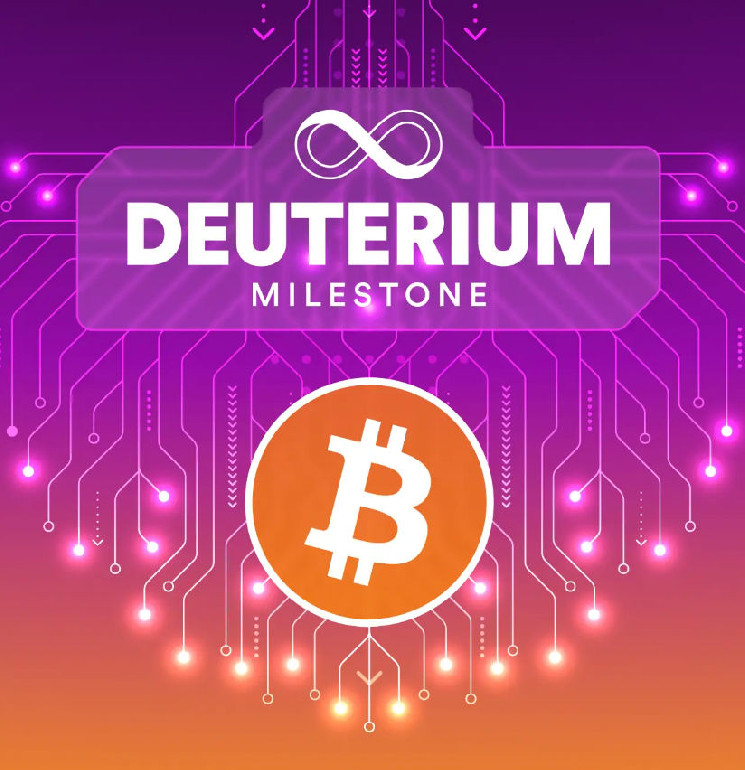Zurich – The Internet Computer Protocol (ICP) has unveiled a groundbreaking advancement in blockchain technology with the integration of threshold Schnorr signatures and on-chain Bitcoin block headers, marking a major milestone known as Deuterium. This update aims to enable developers to unlock unprecedented Bitcoin-native use cases and drive innovation within the ecosystem.
—
Bitcoin is evolving beyond its digital gold status and becoming a cornerstone of a decentralized economy. Recent figures highlight this shift: Runes and BRC20 tokens now outpace regular BTC transactions by a factor of three. With over 68 million Ordinals signups and $459 million in fees, coupled with 15 million Runes transactions, the Bitcoin network is witnessing a flurry of activity and engagement.
However, the Bitcoin network’s lack of native smart contract support has hindered developers for a long time. The Deuterium Milestone addresses this gap with two crucial features:
1. Threshold-Schnorr signing: ICP smart contracts can now perform Schnorr signatures directly, enabling features such as rune etching, ordinal inscription, handling BRC-20 tokens on Bitcoin L1, and Taproot signing transactions.
2. On-Chain Bitcoin Block Headers: Previously, ICP only supported Bitcoin’s UTXO set. The Deuterium milestone extends this to include full Bitcoin block headers, which becomes crucial as new metaprotocols increasingly interact with block headers.
Lomesh Dutta, VP Growth at the DFINITY Foundation, emphasized the importance of this progress:
“The integration of tSchnorr signatures enables ICP smart contracts to natively handle Bitcoin transactions. This breakthrough paves the way for a plethora of new applications, from DeFi lending markets to decentralized indexers. We are already seeing an impressive increase in developer engagement, which we believe will catalyze rapid development within the Bitcoin ecosystem.”
Lomesh Dutta, vice president of growth at DFINITY Foundation
Here’s how ICP’s ecosystem projects are ready to leverage these advances:
Omnity Network
Threshold-Schnorr signatures will fuel Omnity’s growth, allowing the company to manage Bitcoin Taproot assets and connect to other blockchains such as Solana and Osmosis by the end of August 2024. Bitcoin Canister’s block header data will increase the ability to independently verify Bitcoin blocks, ensuring trustlessness. .
Louis Liu, Founder of Omnity Network, stated: “Our integration of Chain Key, ECDSA and Bitcoin RPC canisters has paved the way for the Deuterium milestone. With the new capabilities, including threshold Schnorr signing and Bitcoin Canister block headers, we are strengthening our infrastructure and supporting BRC20.”
Bioniq
Bioniq, with a user base of over 50,000, will use threshold Schnorr signatures for efficient cross-chain asset transfers. As the first Layer-2 solution for Bitcoin Ordinals, Bioniq aims to streamline the trading and minting of Bitcoin-based digital art and collectibles.
Bioniq CEO Bob Bodily commented: “ICP’s Bitcoin integration was exceptional. With the Deuterium milestone, we are excited about the threshold Schnorr is signing for subnet and block headers, which will improve our capabilities and user experience.”
Helix Markets
Threshold-Schnorr signatures will enable Helix to facilitate seamless trading of ICP tokens and other assets without bridging. This update also positions Helix to integrate with major crypto ecosystems, tapping into significant trading volumes and expanding its reach.
Gorazd Ocvirk, co-founder of Helix Markets, enthuses: “The Threshold Schnorr module has enabled effortless cross-chain interactions for us. Our containers can now handle Bitcoin and Solana assets as seamlessly as any other, simplifying our operations and improving security.”
The successful integration of these features into the ICP ecosystem demonstrates the potential for secure, direct interaction with Bitcoin’s liquidity and user base. Developers looking to build Bitcoin applications can explore open bounties and join the DFINITY developer forum for more insights.
—
About the internet computer
The Internet Computer Protocol (ICP) is a decentralized cloud 3.0 network that enables the development and operation of services directly on a public blockchain with exceptional scalability. ICP’s protocol ensures tamper-proof, low-cost and energy-efficient operations and sets a new standard for decentralized networks in Web3.

